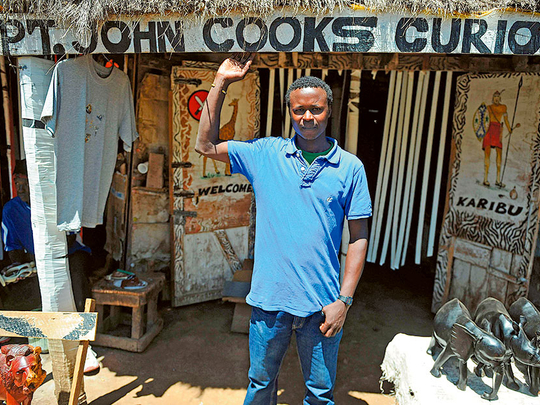
NANYUKI, Kenya: Alphonse ‘Junior’ Mutiso, the 32-year-old proprietor of ‘Cpt John Cooks Curio Shop’ in Nanyuki, Kenya, is an expert in British military badges.
“There are the Royal Engineers, the Royal Irish, Welsh and Scots, The Rifles, Royal Anglian,” he said, listing some of the regalia he’s familiar with.
Since inheriting his father’s roadside shack 10 years ago, Mutiso has hand-carved ornamental wooden badges and insignia for British soldiers who rotate through a training base on the edge of town, a battalion at a time, six times a year.
The British base has underpinned Nanyuki’s economy for decades, but its continued presence is now in question — and causing concern locally.
During protracted negotiations for a new lease, Britain and Kenya have disagreed about who has jurisdiction over uniformed British law-breakers.
Kenya insists the soldiers must be subject to Kenyan law, while Britain says off-duty troops should face Kenyan justice but those on-duty should be punished according to the army’s code of conduct, according to officials from both sides.
In March, President Uhuru Kenyatta and Britain’s foreign minister Philip Hammond discussed the matter during a face-to-face meeting in Nairobi.
A British embassy spokesman said “constructive negotiations” were continuing, adding that a six-month interim agreement was in place “to allow for the conclusion of negotiations”.
In 2012, British soldiers were briefly accused of the murder of a Nanyuki prostitute whose body was found stuffed in a septic tank. Claims in 2003 that 650 women were raped by British soldiers over a 30-year period were found to be based on fake police reports.
In 2002, Britain’s defence ministry paid millions in compensation to 233 people who said they had been injured by unexploded British ordnance in the area.
British officials say the base is the biggest employer in Nanyuki, reckoning it is worth 3.25 billion shillings (€30 million, Dh123 million) a year to the economy, and the uncertainty over its future has many locals worried.
“The British Army are part and parcel of the community,” said government official Wilson Wanyanga, county commissioner for Laikipia. “If they were not there the economy would be hit hard and take a long time to recover.”
Nanyuki’s retailers, wholesalers, labourers, restaurants, bars, nightclubs and landlords all benefit from the British presence, Wanyanga said.
Mutiso says his best customers are British soldiers. They’re also his only customers. Foreign visitors heading on safari in Kenya’s wild north used to pass through Nanyuki, but there are hardly any now.
“A few years ago there were many tourists but there’s been a big change,” said Mutiso.
Tourism plummeted as threats and attacks by Somali-led and Al Qaida-affiliated Al Shabab insurgents trigger travel warnings and holiday cancellations.
Kenya partly blames British travel warnings for the collapse, fraying relations that were already strained by Britain’s support for the International Criminal Court during its failed crimes against humanity case against Kenyatta — over allegations that he helped fuel post-presidential election violence in 2007 that left more than 1,000 dead.
These tensions underlie the dispute over the Nanyuki base.
For Mutiso, the British army protects Nanyuki’s economy from Kenya’s tourism troubles. It also lends the town a strange “little Britain” feeling.
British influence on Nanyuki predates the current army training mission. White settlers came here to farm more than a century ago and their descendants still own ranches and nature reserves. It was also a key base during the Mau Mau insurgency of the 1950s that helped pave the way for Kenya’s independence.
The British presence is still strongly felt.
At Dorman’s coffee shop or Barney’s restaurant, British soldiers in camouflage are a fixture, their uniforms, accents, thick tattoos, often shaved heads and occasionally eccentric moustaches marking them out from civilian patrons.
Every other car on Nanyuki’s streets seems to be a jungle-green army Land Rover with the crossed machete emblem of the British Army Training Unit Kenya (BATUK). British soldiers are as common a sight in Nanyuki as they are rare elsewhere in Kenya.
The soldiers are also regulars at the town’s nightspots and - despite a Wild-West-style bar brawl in 2013 that involved around 200 soldiers, broken bottles and at least one person thrown through a window - they are very welcome.
“When men socialise there will always be some issues,” shrugged Wanyanga, saying that behaviour and discipline had improved markedly since the fight.












